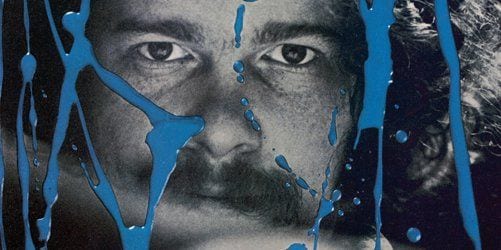
Fug You: An Informal History of the Peace Eye Bookstore, the Fuck You Press, the Fugs, and Counterculture on the Lower East Side opens in 1963 just as Ed Sanders has received a poem from his friend Allen Ginsberg. Sanders is in his final moments of student life at New York University, studying Greek and Latin and developing an interest in Egyptian in his spare time. The Missouri native had not yet opened his Peace Eye Bookstore, had not yet formed The Fugs, had not yet seen the best minds of his generation watch the war against the establishment fizzle, had not yet seen his own face on the cover of Life, nor could he have yet imagined that nearly 50 years on he’d be authoring a book about all the things he had not yet done.
What Sanders had done––about a year earlier, in 1962––was establish Fuck You: A Magazine of The Arts, the underground literary journal published in a “secret location” that carried work from Norman Mailer, Frank O’ Hara, Gary Snider, William S. Burroughs, Charles Olson, and Ginsberg in its pages twixt 1962 and 1965. It’s the story of Fuck You that brings Sanders to the attention of the wider New York scene as he seeks fame and mails copies of the magazine to Picasso, Beckett, Sartre, and Castro, all the while subsisting on a seemingly inedible treat called Yum (eggs, mayonnaise, soy sauce, and oats), watching the United States drift toward war, and trying his hand at becoming a filmmaker. (Note: Anyone who has published a fanzine or an independent rag will totally dig the Fuck You moments of the story––his description of the collating process; the public’s overwhelming roar of indifference.)
Sanders tells the story in a series of vignettes that are sometimes funny, occasionally frightening, and typically littered with the names of The Famous and The Dead as he reels off a series of failed ventures––including an ambitious if not entirely coherent film called Amphetamine Head––and unexpected successes. It seems improbable today that a band such as The Fugs could have happened as organically as it did––to hear Sanders tell it, it was only a matter of deciding that he wanted a band, finding the right players (including the late poet Tuli Kupferberg), booking gigs and finding a label willing to release the group’s music.
Along the way Kennedy dies, rumors of Lee Harvey Oswald having wandered the streets of Greenwich Village fly, and The Fugs record a debut album in 1965 that goes on to become an American classic. Other things happen too––the underground press of the ’60s rises and falls, the victim of government and corporate conspiracies to silence imaginative speech and free thought; Sanders goes to jail after a pornography raid (There go the films!), becomes the subject of a death threat, becomes a father, grapples with what to do with his Peace Eye Bookstore (sounds like a swell place to have gone) and learns that there was something funny about George Plimpton and the company he kept.
All the other elements of life are there––friends die horrible deaths, politicians lie, corruption spreads, bandmates quit and move on to more commercially viable projects, and Sanders comes to the decision that being in a band––especially if that band is The Fugs––requires more of his time and energy than he’s willing to give. As go the 1960s so goes Sanders’ wild youth.
It’s a shame that Fug You is apparently not available in mimeograph form––somehow, for a work that sings such a beautiful ballad of the peak era underground press, it seems only right that we should be able to read this volume in at least one archaic format. No matter. In the end this is a work that recalls with vivid and loving detail the haphazard glory of those wild, wild bygone times by an author who seems decidedly normal despite his affiliations and wild, wild shenanigans.
